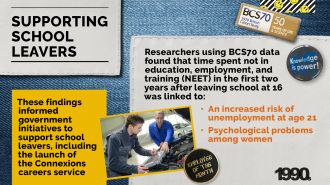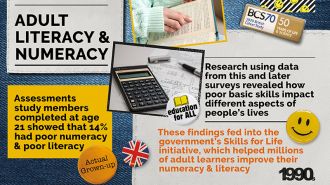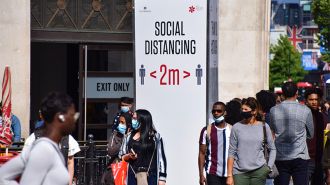
- Our studies
- Our research
- Publications and resources
- Data access and training
- About
- News
- Events
- Get in touch
- Join our mailing list

Welcome to our news and blogs section. Here you’ll find the latest developments and insights from across our longitudinal studies.
The Centre for Longitudinal Studies (CLS) has redeposited data from the 1958 National Child Development Study (NCDS) 2002-2004 Biomedical Sweep, with most data now available to researchers under the UK Data Service’s standard access arrangements (End User Licence) for the first time.

Researchers from around the world have been using CLS study data to tackle important questions. Here is a round-up over 100 new pieces of research that we’ve added to the CLS bibliography between April and September 2020.

16% of teenagers report high levels of psychological distress at age 17, finds a new study led by UCL researchers based on data collected in 2018-19. The findings also show 24% of young people report self-harming and 7% report self-harming with suicidal intent by age 17.
Professor Emla Fitzsimons and Dr Praveetha Patalay have been awarded the 2020 ESRC Celebrating Impact Prize for their research on children and young people’s mental health.

CLS researchers, Professor Alice Sullivan, Professor Emla Fitzsimons and Dr Praveetha Patalay, are finalists for the ESRC’s Celebrating Impact Prize 2020.

Celebrating 50 years of the 1970 British Cohort Study – The 1970 British Cohort Study highlighted how periods of being out of education, employment or training after leaving school can impact on young people’s lives

Celebrating 50 years of the 1970 British Cohort Study – The Age 26 Sweep was the first adult follow-up of BCS70, and over 9,000 cohort members took part.

The data cover a comprehensive range of topics, including education and training, transitions to the job market, mental health and wellbeing, physical development, personality, identity, attitudes and expectations, engagement in risky behaviours, and social media activity.

Celebrating 50 years of the 1970 British Cohort Study – BCS70 findings on adult numeracy and literacy helped to kickstart a series of government education initiatives that would improve the basic skills of millions of British adults during the 2000s.

Children growing up in families with expensive homes have fewer emotional and behavioural problems, finds new research led by the UCL Centre for Longitudinal Studies (CLS) based at the UCL Social Research Institute.

The Centre for Longitudinal Studies (CLS) has secured funding from the Economic and Social Research Council (ESRC), to further its investigation into the immediate and longer term impacts of the COVID-19 pandemic on people in Britain.

CLS is seeking input on the first draft questionnaire of the Age 31 Sweep of Next Steps, a longitudinal cohort study following 16,000 people born in England in 1989-1990.
Ryan Bradshaw
Senior Communications Officer
Phone: 020 7612 6516
Email: r.bradshaw@ucl.ac.uk